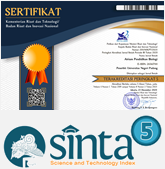The Effect of Model Problem Solving on Students’ Problem- Solving Skills Class VII SMPN 34 Padang
Abstract
This research has motivated the problem of low students’ problem -solving skills. In the learning process, the teacher rarely trains students’ problem-solving skills and currently Science literacy in Indonesia is low compared to other countries. The results of the preliminary test showed that the average problem-solving skills of students was less than 50%. This study aims to look at the effect of the problem- solving model on the problem-solving skills of grade VII students of SMPN 34 Padang. This type of research is a quasi-experimental design with the Control Group Posttest Only Design. The study population was VII grade students of 34 SMPN Padang in the 2018/2019 academic year. The research sample of students in class VII 4 as the experimental class and VII 5 as the control class. Sampling using a purposive sampling technique. Instruments in the form of observation sheets observation of student activities to obtain data problem-solving skills. Based on the results of the students' problem- solving skills research, the t count 2,24> t table 1,67.The study concluded is that the application of the problem-solving model has a positive effect on the problem-solving skills of grade VII students of SMPN 34 Padang.
Keywords
Full Text:
FullpaperReferences
Alberida, H., Fitri, A., dan Ridwan. 2015. “Media Interaktif Untuk Melatih Kemampuan Problem Solving Siswa SMP Kelas VII”. Prosiding Semirata 2015 Bidang MIPA BKS-PTN Barat. Universitas Tanjungpura Pontianak Hal 112-122.
Alberida, H, et al. 2018. “Problem Solving Model for Science Learning”. Conference Series: Materials Science and Engineering. 335 012084
Anugrah, N. 2013. Pengaruh LKPD Berbasisi Pq4R Terhadap Hasil Belajar IPA Fisika kelas VII SMPN 1 Linggo Sari Baganti. Pilar of Physic Education. 84-115.
Becker, V. J. 2004. Innovative Assesment for the 21st Century. USA: Spinger.
Gulo, W. 2002. Strategi Belajar Mengajar. Jakarta : PT. Grasindo
Herawati, S. 2000. Pendidikan MIPA Tingkat Dasar dan Menengah Era Globalisasi di Filipina. Prosiding, Seminar Nasional. Yogyakarta: FMIPA UNY.
Idi, Abdullah. 2011. Sosiologi Pendidikan. Jakarta. PT Rajagrafindo Persada.
Komariah, K. 2011. Penerapan Metode Pembelajaran Problem Solvinng Model Polya Untuk Meningkatkan Kemampuan Memecahkan Masalah Bagi Siswa Kelas IX di SMPN 3 Cimahi. Prosiding Seminar Nasional Penelitian.
Lufri. 2007. Strategi dan Desain Pembelajaran .Padang:Universitas Negeri Padang.
Rahayu, S. 2014. Revitalisasi Scientific Approach dalam Kurikulum 2013 untuk Meningkatkan Literasi Sains: Tantangan dan Harapan. Seminar Nasional Kimia dan Pembelajarannya 2014.
Rahmawati, D., Alberida, H., dan Vioni, K. A. 2015. Buku IPA Terpadu Berbasis Problem Solving Dan Literasi Sains Untuk Siswa Kelas VII SMP. Prosiding Semirata bidang MIPA BKS-PTN Barat Universitas Tanjungpura Pontianak. Hal 421-430
DOI: http://dx.doi.org/10.24036/apb.v5i1.6762
DOI (Fullpaper): http://dx.doi.org/10.24036/apb.v5i1.6762.g3808




